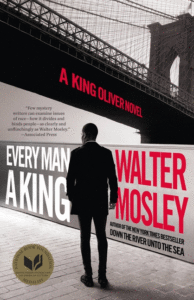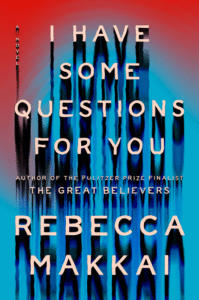
5 Book Reviews You Need to Read This Week
Vivian Gornick on Janet Malcolm’s Posthumous Memoir, Reginald Dwayne Betts on an Oral History of Rikers, and More
Our smorgasbord of sumptuous reviews this week includes Katy Waldman on Rebecca Makkai’s I Have Some Questions For You, Reginald Dwayne Betts on Graham Rayman and Reuven Blau’s Rikers: An Oral History, Bryan Washington on Joseph Earl Thomas’ Sink, Vivian Gornick on Janet Malcolm’s Still Pictures, Daniel Nieh on Walter Mosley’s Every Man a King.
Brought to you by Book Marks, Lit Hub’s “Rotten Tomatoes for books.”
*
“… embraces the intricate plotting and emotional heft that made her previous novel, The Great Believers, a Pulitzer finalist … Bodie, a student of structures, aims to implicate as many people as possible, and so does Makkai. As the title suggests, the novel is addressed to ‘you’—a decision that both mirrors the confiding, intimate quality of podcasts and places the reader under surveillance … Makkai sharply conveys the insidiousness of misogyny. But, in blurring the line between dead-girl stories and shitty-man stories, she raises a tricky question: Should the tropes of #MeToo receive the same scrutiny as those of true crime? …
The creepy teacher has become an almost mandatory presence in female coming-of-age fiction…What distinguishes Makkai’s turn is her detective framing: she understands that every high school, with its indelible characters and astronomical-seeming stakes, is a crime scene. A childhood is a closed case; remembering reopens it … She deftly explores how remembrance can melt into reverie … highlight[s] the numbing, almost hallucinatory pervasiveness of violence against women, and illustrate how greedily such stories are consumed … The result is not a book that leers at a discrete and unfathomable act of violence but one that investigates, as Britt puts it, ‘two stolen lives…’ … It’s the perfect crime.”
–Katy Waldman on Rebecca Makkai’s I Have Some Questions For You (The New Yorker)
“Each time I’ve crossed the bridge to Rikers Island, I’ve thought about the stories within the concrete and brick and steel that make up the place. The only prevailing truth about Rikers is that life there just gets worse, and that’s a result of something more incomprehensible than the decisions of the staff members who walk in each day with varying commitments to reform, or the choices of incarcerated people who awaken each morning with varying expectations for their own rehabilitation. In Rikers: An Oral History, journalists Graham Rayman and Reuven Blau have collected stories that offer a glimpse of what we’ve long ignored: all the many ways people suffer inside Rikers …
No story has ever been enough—as horrific as each one is—to prompt innovation in prison management as compelling and inspiring as the moon landing. And something as profound as the obsession to get to the moon is needed to fix Rikers. The inability to end the horrors that Rayman and Blau amply reveal seems to be an American failure akin to decades of legal segregation … These pages, in their purposeful lack of objectivity and their specificity, become, through the sheer number of maddeningly similar tales, more honest than a piece of scholarship might ever be. The cacophony becomes not the story of any particular person but that of the brick and mortar and barbed wire of a disaster built on a garbage dump … each page demands that you ask: What do I do with this knowledge?”
–Reginald Dwayne Betts on Graham Rayman and Reuven Blau’s Rikers: An Oral History (The Washington Post)

“The trick of memoir resides in the illusion it conjures: Living is ongoing, but the packaged product can imply a totality. Something has been learned, or experienced or endured, and tidily enough to have been condensed between two covers. What the reader ultimately receives is the extract of a life. In deft hands, you’re privy to the purest distillation of its burdens and boons. But despite the ruse of palpable resolution, the business of discerning your identity is dynamic and never-ending. It’s a truth that can undermine the tidy forms of best intentions, but one that—thankfully, generously—remains effervescent throughout the entirety of Sink: A Memoir, by Joseph Earl Thomas …
Through cascading vignettes, the random and ingrained stresses of geography are explicated and endured. White supremacy’s many branches wrap themselves around Thomas and the denizens of his experiences—in the verbal and physical abuse, homophobia and misogynoir in his immediate vicinity, and in the economic disadvantages weathered by his larger Philly communities. But the stream running through it all is the protagonist himself: He watches. He attempts. He screws up. He tries again … In the ecosystem of American publishing, the lack of emphasis on the exceptional is exceptional. In championing the quotidian, with its everyday absence of exemplariness, Thomas really does accomplish the extraordinary. Sink is heavy. It’s a tough book to read. But it is honest. Thomas has constructed a sort of alchemy on the page, but one born of experience, from skill and from a trust about what will end up on the other side; a meticulous, careful construction.”
–Bryan Washington on Joseph Earl Thomas’ Sink: A Memoir (The New York Times Book Review)

“Malcolm was a writer of intense likes and dislikes, and one of her most notorious prejudices was her dislike of what has come to be called ‘life writing.’ She thought the entire enterprise—whether biographical or autobiographical—meretricious. To write about oneself, especially, struck her as embarrassingly wrongheaded. Yet in the last years of her life, when she was sick and dying, she did exactly that … True, many of these pieces were published in The New Yorker or The New York Review of Books before being compiled as a ‘memoir,’ but it’s hard not to wonder whether Malcolm herself, had she been alive, would have wanted to see them published as a book …
Together with its distinctive intellect, Malcolm’s persona also possessed an equally distinctive temperament, one with a strong penchant for the negative. By which I mean that it operated like a cop at a lineup: From the start, everyone is under suspicion … It became a signature trait of hers: looking for (and finding) the incriminating flaw in whoever was standing in front of her. This predilection could sometimes make the world she was surveying feel evenly divided between the mendacious and the severely stupid. In another writer’s hands, that might become wearisome, but in hers it did not. The moral high ground assumed by Malcolm’s persona provided a self-assurance that endowed her work with a strength that was hard to argue with. Out of that self-assurance, Malcolm fashioned some of the most memorable writing in American journalism …
Almost all the pieces are three to eight pages in length; all are possessed of charm and delicacy; and in all of them the young Janet is the character upon whom rests the burden of insight and resolve, the one to whom life is happening. Yet in almost all instances, the piece will be long on description, short on analysis, and more than somewhat vague in intent. If ever a book wished to see the light of day at the same time that it didn’t, this is it … Interestingly, when Malcolm herself looked over her first attempts at autobiography, she judged them inadequate because, in her words, ‘Not only have I failed to make my young self as interesting as the strangers I have written about, but I have withheld my affection.’ After reading the collection, I felt obliged to agree with her.”
–Vivian Gornick on Janet Malcolm’s Still Pictures: On Photography and Memory (The Nation)

“The title of Walter Mosley’s provocative new novel, Every Man a King, is a motto with a violent history. It was the catchphrase of the firebrand Louisiana populist Huey Long, who might have challenged Franklin Roosevelt from the left in 1936, were he not assassinated first. These words—a cry for equality from a bygone era—are a snug fit for Mosley’s novel, which skitters across the spectrum between orthodox and radical like a polygraph needle wired to a nervy accomplice … Freedoms betrayed, classes divided, races at war—such heady themes lace the length of Mosley’s 46th novel. Fans of his Easy Rawlins and Leonid McGill series will not be disappointed, for we remain in the realm of deliciously gritty noir …
Mosley was driving me to Rikers in a cream-colored Bianchina, and Mingus was playing on the stereo. I was along for the ride … The byzantine plot, the suave private eye, all the uncanny similes; it’s a cocktail that skilled authors will serve as long as bartenders are still pouring Negronis … As for Every Man a King, it’s a sterling example of a genre that it scarcely transcends.”
–Daniel Nieh on Walter Mosley’s Every Man a King (The New York Times Book Review)
Book Marks
Visit Book Marks, Lit Hub's home for book reviews, at https://bookmarks.reviews/ or on social media at @bookmarksreads.






















